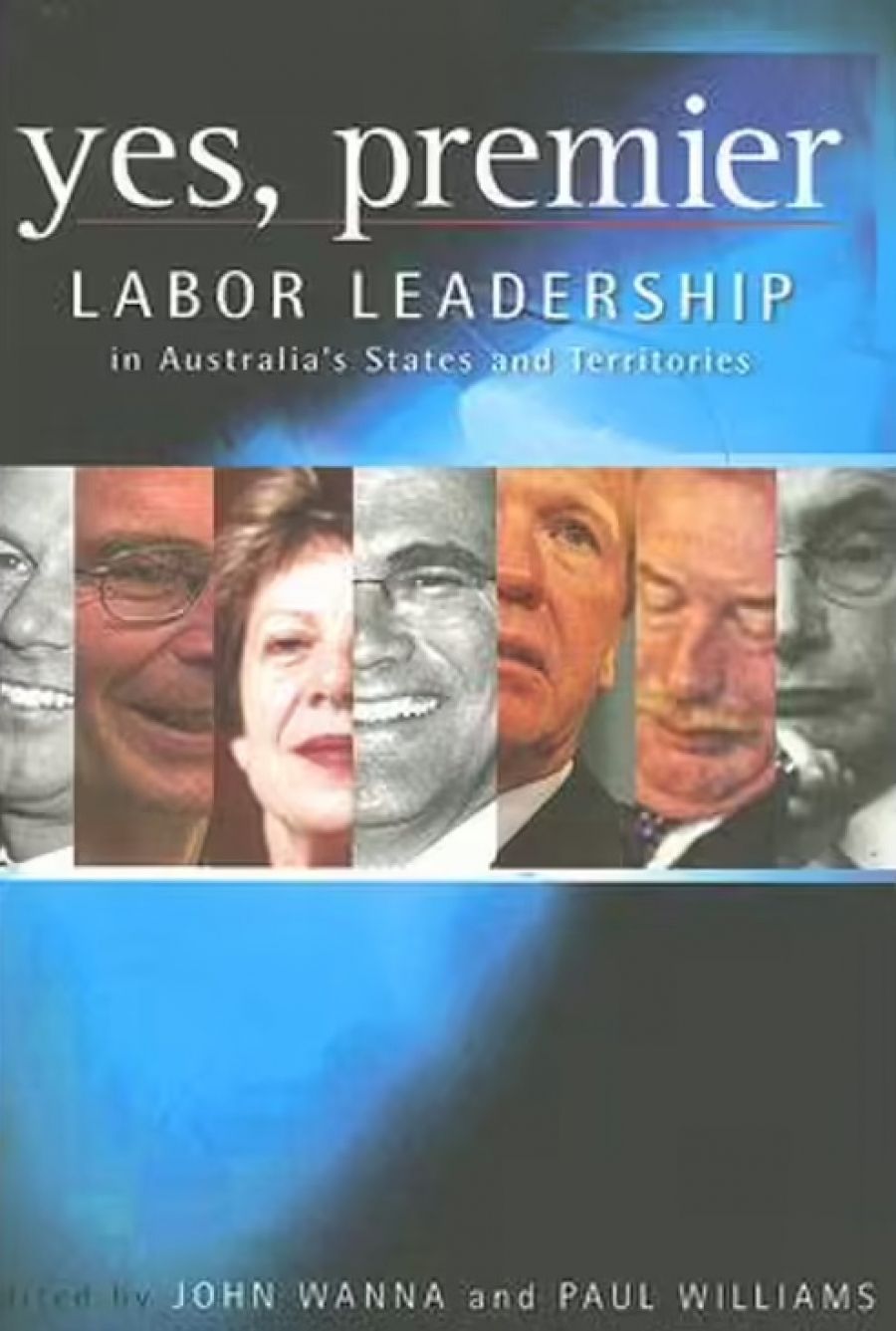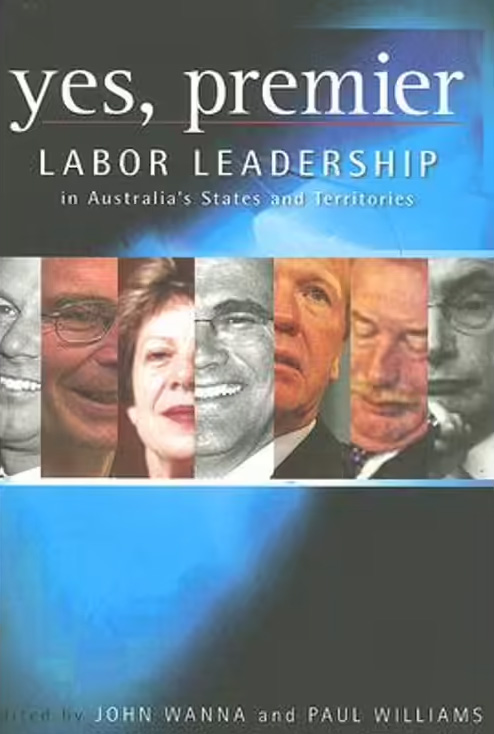
- Free Article: No
- Contents Category: Politics
- Review Article: Yes
- Article Title: Cautious pragmatism
- Online Only: No
- Custom Highlight Text:
This book explores an unprecedented phenomenon: coast-to-coast Labor governments in the states and territories. The peculiarity of the current situation is magnified by Labor’s continuing failure at the national level. Where state politics can boast political ‘stars’ such as Bob Carr and Peter Beattie, federally the cupboard seems bare. Yet this collection reminds us of the unfairness of comparison between Labor’s national failure and sub-national success. Victory is great for your image. It takes considerable historical imagination to appreciate that there was a time when Carr was regarded as ‘a stopgap leader’ – as he was in the aftermath of Labor’s 1988 electoral humiliation. David Clune shows that Carr’s first year or so in office, when the government had a majority of one seat, was no raging success.
- Book 1 Title: Yes, Premier
- Book 1 Subtitle: Labor leadership in Australia's states and territories
- Book 1 Biblio: UNSW Press, $39.95 pb, 273 pp
- Book 1 Cover Small (400 x 600):

- Book 1 Cover (800 x 1200):

Beattie, meanwhile, was elected to Queensland parliament in 1989 after a long career as party reformer and official, but despite his many achievements in the extra-parliamentary organisation, he was passed over for a ministry when the Goss government was formed. Indeed, he spent all but the last few months of that government’s existence on the backbench. As John Wanna and Paul Williams comment, he was very much an outsider ‘until the melt-down after the 1995 state election’, and, in retrospect, his rise to the office of premier seems anything but inevitable.
Much the same might be said of Mike Rann. When Rann became South Australian premier in 2002, he had been Opposition leader since 1994. Haydon Manning suggests that Rann’s career looked like it was going down the drain. As Rann so eloquently put it in the immediate aftermath of the 2002 poll, ‘I’m cactus’. A conservative Independent then unexpectedly decided to support Labor, allowing Rann to form a minority government. In Victoria, Steve Bracks made his own luck in canny dealings with Independent parliamentarians after the 1999 poll, although he was helped by Jeff Kennett’s ham-fistedness. All the same, Bracks’s assumption of office – just six months after becoming leader, and two terms after Labor was thrown out in disgrace by voters – even now looks like the result of ‘a series of miracles’, as Alfred Deakin famously described the accomplishment of Federation.
No less surprising is John Stanhope’s success in the Australian Capital Territory since 2001. One Labor Party member, looking back, commented that he appeared ‘a very unlikely leader and possibly someone who would be an embarrassment’. But Stanhope has grown in the job, especially in the aftermath of the Canberra bushfires. The same party member is rather touchingly quoted at the end of Gwynneth Singleton’s chapter: ‘We in the party are very proud of him now.’
Each chapter in Yes, Premier analyses four areas of political leadership: the premier’s role as policy-broker, decision-maker, crisis-manager and election campaigner. Occasionally, I yearned for more of the probing of personality and political style associated with psychoanalytical approaches to political leadership as found in the work of scholars such as A.F. Davies, Graham Little, James Walter and Judith Brett. Here is Bob Carr’s diary entry at the time unions were picketing parliament during the controversy over workers’ compensation: ‘Finally I march across. I greet them on the steps. I flash a victory sign. Why not? I ram the workers comp package through – emotional debate, I speak, lash them into sense … All in all I enjoyed this crisis.’
Similarly, I suspect that Davies and his school would have enjoyed working with this kind of material. Nevertheless, all chapters explore personality and background – aided by Bob Faulkner’s fine cartoons of each leader – although some authors do so more fully and successfully than others. The chapter by Wanna and Williams, for instance, is a striking portrait of Beattie’s distinctive personal style, whereas Tony McCall and Peter Hay, in an otherwise instructive contribution on Tasmania’s unlovely political scene, pass over Jim Bacon’s Maoism in a sentence, neglect to mention that his sister is the journalist Wendy Bacon and relocate the late Tasmanian premier’s Alma Mater, Scotch College, from Melbourne to Geelong.
In the book’s conclusion, Brian Head, Wanna and Williams suggest that the essays provide an indication of a new style of state leadership. The Labor premier or chief minister is big on accountability, inclusiveness, consultation and ‘bringing the people’ with the government. As well-educated professionals, these politicians are open to the latest ideas about governance, service delivery and the like. They favour ‘social and cultural diversity’. Communication is all-important. The leader essentially determines the government’s image, and exercises much ‘personal influence and authority’. Indeed, to a large extent, the government is the premier, the premier the government. Cautious pragmatism is the order of the day, combined with plenty of forward planning and sensitivity to shifting public opinion. These are ‘ordinary populists’, in the sense that they emphasise being ‘of the people’ and seek to articulate the feelings of the so-called ordinary man or woman, whether the topic in question be ‘Lebanese’ gangs in Sydney or anti-globalisation protestors in Melbourne – described by nice Mr Bracks as ‘fascists and un-Australian’ people who ‘deserved what they got’ at the hands of police.
It is a virtue of this book that, although all chapters, except perhaps that on the Tasmanians, provide a sympathetic account of the subject, neither criticism nor evidence that is open to more than one interpretation is suppressed. In this vein, perhaps Richard Pratt may be allowed the last word on the modern Labor premier: ‘I am a capitalist. Capitalists can’t vote for Labor but I think voting for Bob Carr is a vote for industry and big business.’


Comments powered by CComment